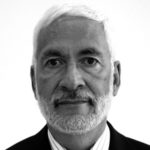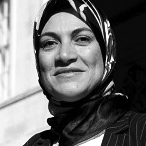Who’s Who

Adelina Comas-Herrera
Care Policy and Evaluation Cente, London School of Economics and Political Science, England
Adelina Comas-Herrera is an Assistant Professorial Research Fellow within CPEC at LSE and was co-lead of the STRiDE project. She is the Principal Investigator of the STRiDE England project and the Social Care COVID Recovery and Resilience research project. She led the LTCcovid.org initiative. Previously she was academic project manager of the Modelling Dementia (MODEM) research project which aimed to estimate the impact, in terms of costs and quality of life, of making interventions that are known to work for people with dementia and their carers more widely available by 2040. She has been a consultant for the WHO, working on the development of a tool for countries to self-evaluate their long-term care systems. She has previously worked on making projections of future long-term care expenditure for the UK and other countries, and also on evaluating the potential role of private insurance and private/public partnerships in long-term care financing.

Alan Glanz
Care Policy and Evaluation Centre, London School of Economics and Political Science, UK
Dr Alan Glanz is supporting research within WP10 (Knowledge exchange and impact) on the types of knowledge used in policymaking in STRiDE countries.

Alia Ibnidris
Independent Consultant, International
Alia Ibnidris is working with Emiliano Albanese on the STRiDE project, particularly focusing on evidence review.

Ana Carolina Franzon
FEBRAZ, Brazil
Ana Carolina Franzon is a journalist, with a MSc in public health and a PhD in community health, both by University of São Paulo. Working since 2020 as a project assistant at Febraz, the Brazilian Federation of Alzheimer’s Associations, her interests and expertise rely on communications and advocacy for human rights and health, sustainable development and inequalities reduction amongst and within countries, working mostly via civil society organizations.

Anji Mehta
Care Policy and Evaluation Centre, London School of Economics and Political Science, England
Anji Mehta is Centre Manager of the CPEC at LSE and Finance and Impact Manager within the NIHR School for Social Care Research. Over the last nine years, Anji has also been working on studies exploring knowledge exchange and impact for adult social care research, implementation of research, engagement of practice and policy in research processes, and the types and use of knowledge in decision-making.

Carolina Godoy
Department of Psychiatry and Medical Psychology at Federal University of São Paulo (UNIFESP), Brazil
Carolina Godoy is a gerontologist by University of São Paulo (USP), specializing in neuropsychological rehabilitation by the Federal University of São Carlos (UFSCar). She is currently a master’s degree candidate at the Department of Psychiatry and Medical Psychology at Federal University of São Paulo (UNIFESP), with research interest on dementia-related stigma. She has clinical experience with cognitive stimulation, professional and family caregivers, people living with dementia care and residential care homes.

Chiara De Poli
Care Policy and Evaluation Centre, London School of Economics and Political Science, England
Chiara is a researcher at the Care Policy and Evaluation Centre (CPEC) at the London School of Economic and Political Science (LSE). Her interests are in applied health and social care research, in the design and evaluation of complex interventions, and in research ethics in the context of collaborative research involving vulnerable groups. With her team she has recently completed a five-year collaborative study with people with dementia and their families in the North-East of England (UK). Participants first identified the gaps in their local dementia care and support system and then co-designed two interventions to help address those gaps. The study facilitated the co-design and supported the implementation and evaluation of the interventions. Chiara is also a PhD candidate in Social Policy at the LSE. Her PhD work explores how collaborative approaches to research unfold in practice and their impact on policy making.

Christine Musyimi
Africa Mental Health Research and Training Foundation, Kenya
Dr Christine Musyimi is a community mental health researcher at Africa Mental Health Research and Training Foundation. She received her PhD in Global Mental Health from Vrije Universiteit, Amsterdam, and MSc in Medical Statistics and BSc in Nursing from the University of Nairobi, Kenya. She has written extensively (in book chapters and peer-reviewed journals) on initiating collaborative processes between the formal and informal health sectors including introduction of mental health evidence-based approaches in the latter sector. She has also been a Principal Investigator on three mental health related grants funded by Grand Challenges Canada and Grand Challenges Africa.

Clarissa Giebel
NIHR ARC NWC, Department of Primary Care and Mental Health, England
Dr Clarissa Giebel is Senior Research Fellow at the University of Liverpool and the NIHR ARC NWC, leading on national and international research into inequalities in dementia care. Her research looks at the barriers and facilitators of accessing and utilising post-diagnostic care in dementia, and she has led national COVID-19 social care studies on community-residing and care home-based people with dementia, their carers, and staff, which were subsequently rolled out across 5 countries.

Claudia Astudillo-Garcia
National Institute of Geriatrics, Mexico
Claudia Astudillo-Garcia is a researcher within the Mexico country team.

Claudia Iveth Astudillo-Garcia
Psychiatric Care Services, Ministry of Health, Mexico
Claudia Astudillo Garcia is a researcher in Psychiatric Care Services, Ministry of Health in Mexico. She has a PhD in Public Health Sciences with a specialisation in Epidemiology. Her work focuses on mental health epidemiology, methodology and analysis of information, as well as training of human resources in mental health.

Cleusa P Ferri
Universidade Federal de São Paulo, Brazil
Cleusa P Ferri is a psychiatrist and epidemiologist, and currently a Professor in the post-graduation program of the Psychiatry Department at the Universidade Federal de Sao Paulo, Brazil. She has contributed to the estimation of the global burden of dementia and to the WHO Mental Health Gap Action Programme for dementia. She is also a member of the Medical and Scientific Advisory Panel of Alzheimer’s Disease International and has contributed to a few ADI’s World Alzheimer Reports. Cleusa worked for more than a decade at King’s College London (UK), developing research on the epidemiology of dementia and other chronic conditions among older people in low- and middle-income countries. Currently in Brazil, she continues to carry out research, which focuses on the epidemiology and care provision for late-life mental disorders in low resourced settings.

Crick Lund
University of Cape Town, South Africa
Professor Crick Lund is Director of the Alan J Flisher Centre for Public Mental Health at the University of Cape Town. He is CEO of PRIME (Programme for Improving Mental Health Care), a DFID-funded research consortium focusing on the integration of mental health into primary care in low-resource settings, and Principal Investigator of AFFIRM (Africa Focus on Intervention Research for Mental Health) U19 NIMH Collaborative Hub. He trained as a clinical psychologist and was involved in developing post-apartheid norms for mental health services for the national Department of Health. He also worked on the development of the WHO Mental Health Policy and Service Guidance Package, and consulted to Lesotho, Namibia, Indonesia, South Africa and Zimbabwe on mental health policy and planning. His research interests lie in mental health policy, service planning and the relationship between poverty and mental health in low and middle-income countries.

David M Ndetei
Africa Mental Health Research and Training Foundation, Kenya
David M Ndetei is Professor of Psychiatry at the University of Nairobi, Kenya and Founding Director of Africa Mental Health Research and Training Foundation, an NGO dedicated to research for evidence-based policy, practice and promotion of mental and neurological health, and healthy behaviour. He has authored 320 scientific publications, 21 monographs and 5 books. David holds positions in several professional bodies including Chair of Africa Division of the Royal College of Psychiatrists, UK and board member of the World Psychiatric Association and World Association of Psychosocial Rehabilitation. His vision is affordable and evidence-based mental health services for Kenya.

David McDaid
Care Policy and Evaluation Centre, London School of Economics and Political Science, UK
David McDaid is an Associate Professorial Research Fellow in Health Policy and Health Economics within CPEC at LSE. He is involved in a wide range of work on mental health and public health in the UK, Europe and at the global level. He has published over 300 peer reviewed papers and reports, including a report for the UK Department of Health which looked at the economic case for investing in mental health promotion and mental disorder prevention.

Deborah Oliveira
Universidade Federal de Sao Paulo, Brazil
Deborah Oliveira has a background in nursing and has a Master’s degree in Nursing Science from the University of Campinas (UNICAMP), Brazil. She was awarded her PhD by the University of Nottingham (UoN), United Kingdom, in 2017. Deborah has clinical and research experience with family carers and older people living with dementia. She has previously worked as a research fellow for several UK and European projects based in the UK. Her interests are related to mixed-methods research and scale development in health-promoting self-care in older adults, dementia risk reduction, quality of life and long-term care.

Dubhglas Taylor
Dementia Alliance International, Australia
Dubhglas Taylor is care partner for Eileen Taylor. He helped develop the first dementia support organisation in Brisbane. He has supported and been involved with Eileen in advocating for her and others over the years; including supporting Eileen through her dementia clinical trial journey. Dubhg is a co-founder of DAAT (Dementia Awareness Advocacy Team) and is actively involved with their “Remember Me” Dementia Support Group. He has a Master’s Degree in Social Science and a clinical background in social work, working for the past thirty years as a therapist / supervisor / educator and lecturer. He still lectures at university level in CHC’s Social Science School. He is a public speaker at various community groups and organisations, discussing dementia and other social issues. Along with Eileen, he is a fierce advocate in fighting for the rights of people living with dementia.

Eileen Taylor
Dementia Alliance International, Australia
Eileen Taylor was diagnosed with early onset familial Alzheimer’s in 2009. She is currently Secretary of Dementia Alliance International (DAI) and hosts their Australia online weekly support group. She is Vice Chair of Dementia Australia, a member of their Advisory Group on Dementia Friendly Communities and a co-founder of DAAT (Dementia Awareness Advocacy Team). During 2016, she presented at the Dementia Australia National Consumer Summit in Canberra, the ADI Conference in Budapest and at the ADI’s Regional Conference in New Zealand. She also presented a poster at the Dementia Australia 2018 national conference “Be the Change”. She was a personal counsellor for nearly 20 years (now retired) and has an M.in HS (Hons) Rehab from Griffith University. Eileen has been a research study participant at The Prince Charles Hospital Geriatric Research Unit since she was diagnosed, and has participated in three clinical trial studies so far.

Elaine Mateus
FEBRAZ, Brazil
Elaine is Chair of Febraz – Brazilian Federation of Alzheimer’s Associations. She is the STRiDE NGO lead on behalf of Febraz and member of STRiDE’s International Advisory Group. After her Mum’s diagnosis with dementia in 2012, Elaine commits much of her time as a volunteer for the cause. She is a Professor at the State University of Londrina, Brazil, with a PhD in Applied Linguistics and 30-years of working in education, critical language studies, and socio-cultural and humanities research.

Elisa Aguzzoli
Care Policy and Evaluation Centre, London School of Economics and Political Science, UK
Elisa Aguzzoli is a research assistant within CPEC at the LSE. She pursued her MSc in Global Health Policy at the LSE and her BSc in Anthropology at Brunel University London. Elisa’s interests concern applying an anthropological perspective on matters such as global mental health, dementia, and access to medicines. Within the STRiDE project, she edited the desk reviews of each country and made them available on the website.

Elizabeth Mutunga
Alzheimer’s & Dementia Organisation Kenya, Kenya
Elizabeth Kasimu Mutunga is a trained psychologist and human rights practitioner. She developed an interest in Alzheimer’s disease after her father was diagnosed in 2007. At the time the disease was a mystery to her and her family. In trying to understand how best to cope with the disease and care for the father better, she started looking for a support group which she could plug into and get support, encouragement and walk with other caregivers. When she found no support groups, she decided to start a monthly support group herself. Due to her passion to help others affected by the disease, she decided to start an NGO and Alzheimer’s and Dementia Organisation Kenya was founded.

Emiliano Albanese
Personal Social Services Research Unit, London School of Economics and Political Science, International
Emiliano Albanese is a consultant on the STRiDE project. He is a physician with an FMH in public health, an MSc in public health and an MD-PhD in clinical neuropsychology. Emiliano is Assistant Professor of public mental health in the Department of Psychiatry and Director of the WHO Collaborating Center for Research and Training in mental health at the University of Geneva. He worked at and still collaborates with the Institute of Psychiatry (King’s College London) and the National Institute on Aging (NIH, Bethesda, USA), and collaborates with the Lisbon Institute of Global Mental Health; and is an active member of the ADI 10/66 group. He has collaborated with the WHO Department of Mental Health and Substance Abuse in a number of activities including the WHO mhGAP and other dementia-related programmes. The focus of his research is cognitive aging and dementia and their epidemiology from a broad public health and evidence base perspective.

Emily Freeman
Care Policy and Evaluation Centre, London School of Economics and Political Science, UK
Dr Emily Freeman is an anthropological demographer focused on ageing and sexual and reproductive health, and the way in which they shape and are shaped by social institutions and processes. Emily’s research includes long term social care in Africa, sexual behaviour and HIV/AIDS in older age, sexual health (including abortion), sexual partnerships and fertility intentions.

Erica Breuer
University of Cape Town, England
Erica Breuer is a global health researcher with skills and expertise in mental health, health services research, monitoring and evaluation, programme management and theory driven evaluation. Since 2011, she has worked on the Programme for Improving Mental Health Care (PRIME) based at the Alan J Flisher Centre for Public Mental Health in the Department of Psychiatry and Mental Health. She holds an MPH from the University of Cape Town and has recently submitted her PhD looking at the role of Theory of Change as an approach to designing and evaluating complex interventions in health care.

Fabiana Da Mata
Universidade Federal de São Paulo, Brazil
Fabiana Da Mata is a post-doctor researcher at the Universidade Federal de São Paulo and has joined STRiDE as an early career researcher. She pursues a Ph.D. in Medical Sciences from the Universidade de Brasilia, Brazil, and a Master’s degree in Gerontology from the King’s College London, UK. She is a physiotherapist with clinical expertise in older people. Her research interest and experience are older people, people living with dementia, carers, healthcare, long-term-care services, and models of care.

Huseyin Naci
Department of Health Policy, London School of Economics and Political Science, UK
Dr Huseyin Naci is an Assistant Professor of Health Policy and Programme Director to the Executive MSc in Health Economics, Outcomes, and Management in Cardiovascular Sciences within the Department of Health Policy at LSE. Huseyin’s academic interests include pharmaceutical regulation, comparative effectiveness research, and health policy evaluation. His recent research evaluated the evidence requirements for market entry of new health technologies.

Imelda Theresia
Alzheimer’s Indonesia, Indonesia
Imelda Theresia has extensive experience in project management and implementation for social protection and awareness raising programmes. Theresia is currently a member of the Executive Board of Alzheimer’s Indonesia (ALZI) and Supervisory Board of OnTrack Media Indonesia. She has coordinated many projects and worked for numerous donors and agencies including USAID, European Union, Unicef, UNFPA ACIL and ICMC, AUSAID, World Bank and Grand Challenges Canada. Theresia supports ALZI in finance and campaign strategies, and since 2014, she has worked closely with ALZI to kick-start Alzheimer’s Awareness in Indonesia, achieving a public relations value of US$ 2 million and reaching an estimated 66 million people in one year.

Ishtar Govia
University of the West Indies, Jamaica
Dr Ishtar Govia, Lecturer in Epidemiology at the Caribbean Institute for Health Research, UWI Mona, is a research psychologist, specializing in mixed methods and implementation science. She is the Managing Director of the Jamaica Mental Health Advocacy Network and works with persons with dementia and their helping network. Her research interests include social determinants of health and evidence-based treatments for common mental disorders and dementia, especially holistic approaches using personalized and coordinated care and integrating mental health and/or dementia problems in the care of other non-communicable diseases in resource-constrained contexts. Central to her work is the cultivation of partnerships and capacity building for health research, interventions, and systems strengthening in the Caribbean.

Janelle Robinson
University of West Indies, Jamaica
Janelle Robinson is a researcher with the Jamaica team. Janelle’s work and interests revolve around understanding psychological trauma and the integration of culturally and conceptually valid assessment tools. Partially funded by the Pinkerton Graduate Fellowship, she completed Masters level training at the John Jay College of Criminal Justice, New York, NY –an MA in Forensic Psychology and another MA in Forensic Mental Health Counselling. In her work in New York, she contributed to the enhancement of youth justice agencies and worked closely with young persons and their families in the capacity of court advocate and youth mental health provider. She is committed to creating and implementing culturally valid trauma-focused assessments and interventions for Caribbean people and to mental health public education and awareness in Caribbean and other under-served populations. She is a researcher at the Caribbean Institute for Health Research (CAIHR), UWI Mona, Jamaica, and within the Epidemiology Research Unit, she is a member of Mental Health Programme team.

Jayeeta Rajagopalan
Care Policy and Evaluation Centre, London School of Economics and Political Science, England
Jayeeta Rajagopalan holds a BSc in Global Health and Social Medicine from King’s College London and an MSc in Global Health Policy from the London School of Economics and Political Science. Her key research interests include ageing and social care, mental health and measuring health system performance. She joined the STRiDE India team as an Early Career Researcher at the National Institute of Mental Health and Neurosciences [NIMHANS] in 2020. In April 2022 she joined the Care policy and Evaluation Centre at the London School of Economics as part of the STRiDE England team.

Kate Swaffer
Dementia Alliance International, Australia
Kate Swaffer is co-founder, Chair and Chief Executive Officer of Dementia Alliance International. Kate is also an elected Board member of Alzheimer’s Disease International, and a full member of the World Dementia Council. She is retired nurse, and now an activist for human rights for people with dementia and their families, and also lives positively with young onset dementia. Kate is an international speaker, widely published academic and author and a poet and regular blogger. She is also a PhD Candidate at the University of Wollongong. In 2017, she was a recipient of the South Australian Australian of the Year award; in 2016 she received the University of Wollongong Alumni Social Impact Award; and was one of 100 Women of Influence in Australia, also in 2016. Kate has been instrumental in ensuring Dementia Alliance International is one of the founding members of the newly established Global Rehabilitation Alliance. Kate is actively involved on a number of international, national and local Dementia or Civil Society Steering Committees, Advisory or Working groups, and was an invited keynote speaker at the WHO First Ministerial Conference on Dementia in 2015.

Klara Lorenz-Dant
Care Policy and Evaluation Centre, London School of Economics and Political Science, UK
Klara Lorenz-Dant is a Research Officer working on both the STRiDE (Strengthening responses to dementia in developing countries) and the MODEM (modelling outcome and cost impacts of interventions for dementia) projects and the and will shortly complete her PhD at LSE looking at the well-being and quality of life of unpaid carers of people with dementia. Klara has research interests in health economics and policy issues surrounding the topics of geriatrics and mental health. Before coming to the LSE, she contributed to the OECD response to Dementia, while pursuing a Traineeship at the Organisation of Economic Cooperation and Development in Paris. Klara received a Masters in Public Health from the École des Hautes Études en Santé Publique in France in 2014 and a Bachelor Degree of Arts and Honours in Applied Economics and International Relations from Kingston University London (2012).

Luis Miguel Gutiérrez Robledo
National Institute of Geriatrics, Mexico
Dr Luis Gutiérrez currently serves as Director General of the National Institute of Geriatrics at the National Institutes of Health in Mexico. He trained in France in geriatric medicine and the biology of ageing.

Marguerite Schneider
University of Cape Town, South Africa
Dr Marguerite (Margie) Schneider is a researcher in the field of disability studies, and Assistant Professor and Deputy Director at the Alan J Flisher Centre for Public Mental Health, UCT. She started her career as a Speech-Language Pathologist and Audiologist before moving into broader social science research focusing on disability studies. She has worked at the Community Agency for Social Enquiry, the WHO, the Human Sciences Research Council and as an independent consultant in the field of disability studies. A number of her publications have been on disability measurement and she is involved in the Washington Group on Disability Statistics which aims to develop internationally comparable survey measures of disability.

Mariana López Ortega
National Institute of Geriatrics, Mexico
Mariana López-Ortega currently works as Researcher at the National Institute of Geriatrics, National Institutes of Health in Mexico City.

Marissa Stubbs
University of West Indies, Jamaica
Marissa Stubbs is a researcher with the Jamaican team. Born and raised in the Bahamas, Marissa is a graduate of the M.Sc. Clinical Psychology programme at the University of the West Indies, Mona Campus, Jamaica and works as a Researcher at the Caribbean Institute for Health Research (CAIHR), UWI Mona, Jamaica. Working in the CAIHR Epidemiology Research Unit, she is a member of Mental Health Programme team. Her research interests include patterns of adult attachment, the importance of social connectedness for psychological well-being and how psycho-social factors affect an individual’s health. In her role as an Associate Clinical Psychologist at a private practice in Kingston, Jamaica she conducts psycho-educational and personality assessment, which align with her passionate commitment to the development of comprehensive interventions for persons with academic or behavioural challenges. Over the years, her active engagement in outreach and support activities have been channelled through her role as a Resident Hall advisor, giving talks to university students, parenting and youth groups, and appearing on local radio programmes.

Martin Knapp
Care Policy and Evaluation Centre, London School of Economics and Political Science, England
Martin Knapp is Professor of Social Policy and Professorial Research Fellow within CPEC at LSE. He is the Principal Investigator for the STRiDE project. He has also been Director of the NIHR School for Social Care Research since 2009. His current research emphases are primarily dementia, child and adult mental health, autism and long-term social care; much of his work has an economic focus, and in all of it he seeks to tease out the policy implications. He has published almost 600 peer-review journal papers and 15 books. His work has had numerous impacts on policy and practice in these areas.

Maximilian Salcher-Konrad
Care Policy and Evaluation Centre, London School of Economics and Political Science, UK
Maximillian Salcher-Konrad is a Research Officer within CPEC at LSE using structured reviews and meta-analyses to assess current evidence on what works in dementia care in developing countries. He also works as a Research Officer part-time within LSE Health. Maximilian’s research interests include real world evidence, evidence synthesis, study design, decision-making at the patient and population levels and economic evaluation. Maximilian’s PhD research focuses on evidence requirements for drug marketing authorisation. His empirical work includes an evaluation of evidence standards in accelerated access pathways, focusing on the role of non-randomised studies and surrogate measures. He obtained his MSc in Health Policy, Planning and Financing from LSE and LSHTM in 2014. Prior to moving to London, he completed his undergraduate studies in economics at the Vienna University of Economics and Business and worked as a research assistant at the Institute for Advanced Studies in Vienna, Austria.

Meera Pattabiraman
ARDSI - Alzheimer's and Related disorders Society of India, India
Mrs Meera Pattabiraman is Chairperson of the Alzheimer’s and Related Disorders Society of India and has been associated with the NGO for twenty years. She has varied work experience – counselling, planning and setting up of care facilities for persons with dementia, conducting training programmes and advocating with state and central governments. Her biggest success is the Kerala State Initiative on Dementia, the first state private partnership for dementia care, diagnosis, training and awareness in India. She is one of the authors of the Dementia India Report 2010, a member of the World Dementia Council and board member, ADI.

Michael Lefevre
Alzheimer’s Disease International, UK
Michael Lefevre is General Manager at ADI. He is in charge of all aspects of ADI’s Finance and IT systems, projects, HR and governance including financial reporting, accounts and planning.

Narendhar Ramasamy
Executive Director, ARDSI-Alzheimer’s And Related Disorders Society of India, India
Narendhar has been the Executive Director of ARDSI since 2009. He is also a founding member of the India Alliance for Patients’ Group and Healthy India Alliance (a member organization of Global NCD Alliance). He is the Vice President of the Society for All Round Development-SARD. He has been actively engaged in public policy and advocacy for Dementia, the rights of elders and children. He is also part of Governing Board member of NEG-Fire a funding organization working for functional, language and numeracy skills of marginalized children since April 2020.

Nicolas Farina
Brighton and Sussex Medical School, UK
Dr Nicolas Farina has eclectic research interests spanning from the benefits of physical activity, to identifying ways to maintain and improve people’s quality of life. The consistent element of his research is that it always involves people with dementia. More recently, his research interests have moved to understand people’s attitudes of dementia and also how best to improve them.

Paola Barbarino
Alzheimer’s Disease International, UK
Paola Barbarino is Chief Executive Officer at ADI. Paola is in charge of all aspects of ADI’s work. Collaborating with the Board, Paola implements finance and campaign strategies. Paola represents ADI at international conferences and in the NCD Alliance and takes part in WHO and UN meetings.

Patricia Conboy
HelpAge International, International
Patricia Conboy is Interim Director, Global Ageing, Advocacy and Campaigns at HelpAge International and Chair of STRiDE’s International Advisory Group.

Petra du Toit
Alzheimer’s South Africa NPC, South Africa
Petra du Toit is Executive Director of Alzheimer’s South Africa. She specialised in Medical Social Work at the University of Stellenbosch, and has worked as a social worker in the fields of dementia, mental health, military social work and trauma. In 2011, Petra joined Alzheimer’s South Africa as a social worker and was appointed as Executive Director in 2015. She is passionate about contributing to the quality of life of people living with dementia and their families working towards the development of a National Dementia Plan for South Africa in cooperation with relevant role players, establishing and developing a Dementia Friends Programme in South Africa, and supporting and actively taking part in research in the field of dementia in South Africa.

Priya Thomas
National Institute of Mental Health and Neuro Sciences, India
Dr Priya Thomas is a researcher in the India team. She is interested in how human beings respond to and cope with chronic illness in life. Priya is engaged in developing and rendering psychosocial interventions in neurological disorders. She has special interest and expertise in qualitative research methodology and palliative care.

Rochelle Amour
Alzheimer’s Jamaica, Jamaica
Rochelle Amour is the Researcher and NGO Liaison, and the co-founder of the Age Caribbean Consultancy. She has a BSc in Psychology (1st Class Honours), with a minor in Human Resource Management, and is certified in Project Management. She worked at the Division of Ageing in Trinidad before pursuing her MSc in Gerontology at King’s College London. While at King’s, she worked with Help Age International developing content for the 2014 Global Age Watch Index and collaborating on dementia research at the King’s Old Age Psychiatry Unit at the Institute of Psychiatry, Psychology, and Neuroscience. Rochelle is also a registered nonfiction writer with the Culture Division in Trinidad and Tobago.

Rosa Farres Gonzalez Saravia
Mexican Alzheimer's Federation, Mexico
Rosa Farres has a degree in Special Education and a specialization in Family Dynamics, she also has a Diploma in Alzheimer's Disease. She is president of the Mexican Civil Association of Alzheimers and Similar Diseases (AMAES) in Mexico City, and was president of the Mexican Federation of Alzheimers (FEDMA) from 2018-2022. Rosa is the daughter of a person with dementia.

Roxanne Jacobs
University of Cape Town, South Africa
Roxanne Jacobs has joined the South African team at the Centre for Public Mental Health at the University of Cape Town, as an early career researcher on the STRiDE project. She is a research psychologist with a background in psychology, research methods and gender women’s studies. Roxanne has worked with multi-disciplinary teams both locally and internationally on public health- and social science subject areas, with a particular focus on injury prevention and the psychosocial recovery of vulnerable groups to adverse events within a resource constrained setting like South Africa.

Saadiya Hurzuk
ARDSI - Alzheimer's and Related disorders Society of India, India
Saadiya Hurzuk is a Psychologist with MSc in Dementia studies from University of Stirling. She has over six years of experience as a dementia professional working in various different setups like hospitals, daycares and memory clinics and is currently working as Centre Manager and Dementia Psychologist at ARDSI Hyderabad Deccan, running a full time Dementia daycare incorporating a holistic approach. She is involved in various studies on topics such as person centred approaches in dementia care, benefits of cognitive stimulating activities in people living with dementia, etc. and actively campaigns for dementia awareness across India.

Sara Evans-Lacko
Care Policy and Evaluation Centre, London School of Economics and Political Science, UK
Dr Sara Evans-Lacko is a mental health services researcher with a particular interest in the role of health services and social support in the prevention and treatment of mental illness. Her research focuses on developing innovative methods to improve access to and quality of mental health care for young people and cross-cultural applications of this in addition to the evaluation of public health interventions such as the Time to Change anti-stigma campaign which aim to improve important changes at the population level.

Shereen Hussein
Independent Consultant, International
Professor Shereen Hussein is a consultant on the STRiDE project. Shereen is a Professor of Care and Health Policy Evaluation at the PSSRU at Kent and an Adjunct Professor of Applied Statistics and Population Science at the University of Southern Queensland, Australia. Shereen brings over 25 years experience of research in aged and dementia care models with a particular focus on workforce planning and strategies. She has advised the Australian government in relation to the National Disability Insurance Scheme as well as a number of other governments, including Turkey and Oman, to formulate new ageing and dementia care policies and strategies. She has worked with several international organisations including the United Nations, UNICEF, the World Health Organisation and the World Bank.

Sube Banerjee
Brighton and Sussex Medical School, UK
Sube Banerjee is Executive Dean in the Office of Vice Chancellor at the University of Plymouth. Clinically he works as an old age psychiatrist. Sube is active in health system development and works with industry and governments on health systems, policy and strategies to improve health for older adults with complex needs and those with dementia. Sube’s research focuses on quality of life and quality of care in dementia.

Sumaiyah Docrat
University of Cape Town, South Africa
Sumaiyah Docrat is a South African health economist and PhD candidate at the Alan J Flisher Centre for Public Mental Health, University of Cape Town. Sumaiyah’s work has included the development of cross-country research methodologies, the analysis of household survey and health system financing data and ongoing engagement with key stakeholders involved in mental health services and financing across the six low-and-middle income country sites of the Emerald (Emerging mental health systems in low- and middle-income countries) Project.

Suvarna Alladi
National Institute of Mental Health and Neuro Sciences, India
Dr Suvarna Alladi is a Professor of Neurology at the National Institute of Mental Health and Neurosciences, Bangalore. She graduated with a DM degree in Neurology from NIMHANS Bangalore in 1998, and obtained a Postgraduate Certificate in Cognitive Ageing Research Methods for Medical Scientists from the University of Edinburgh in 2012. In 2006, she was awarded the Commonwealth Academic Staff Fellowship in Cognitive Neurology at the University of Cambridge.

Tara Puspitarini Sani
Alzheimer’s Indonesia, Indonesia
Tara Sani is Scientific Director in Alzheimer’s Indonesia (ALZI). She graduated from Faculty of Medicine, Atma Jaya Catholic University of Indonesia, where she holds an academic post. Her involvement in ALZI includes organising over 140 dementia education sessions for schools and communities in Jakarta as well as educating medical students, healthcare professionals and caregivers through workshops and ADI’s Dementia Care Skills training. She attended ADI’s Alzheimer’s University 2015 in London. In 2016, she received Indonesia Endowment Fund for Education scholarship to pursue MSc Dementia: Causes, Treatments and Research in UCL Institute of Neurology, and volunteered for St. Joseph’s Hospice during her time in London.

Uchenna Nkwonta
Care Policy and Evaluation Centre, London School of Economics and Political Science, UK
Uchenna Chukwuemeka is a research assistant working on the STRiDE project carrying out a review of the evidence on pathways to policymaking in low- and middle-income countries.
He is a Global Health Policy student at LSE with considerable clinical and volunteer experience in the delivery of medical and support services to patients in rural and urban settings in sub-Saharan Africa. He has been involved in research projects involving cost-of-illness analysis of diabetes among adult patients living with type II diabetes in Rwanda, having also assessed prevalence and coping strategies of depression amongst medical students in south-eastern Nigeria.
Uchenna has a keen interest in health system research that can assist decision-making and financing of healthcare delivery strategies for non-communicable diseases in low- and middle-income countries, especially in the areas of mental health and social care.
He has a medical degree from the University of Nigeria and a Master’s degree in Global Health Delivery from the University of Global Health Equity, Rwanda. His particular interests are health system research, mental health, social care, health system strengthening, health policy analysis, and monitoring and evaluation.

Wendy Weidner
Alzheimer’s Disease International, UK
Wendy Weidner joined Alzheimer’s Disease International (ADI) as Research and Policy Project Lead in 2018. She is responsible for ADI’s participation in the STRiDE project and other research that ADI is involved in, including liaising with ADI’s Medical and Scientific Advisory Panel. Previously, Wendy worked at Dementia UK, where her role involved working collaboratively to develop and improve dementia services, developing business cases, promoting the work of the organisation and managing the business development team. Wendy has also managed a local reminiscence project for people living with dementia and worked for a number of organisations in Africa.

Yuda Turana
Atma Jaya Catholic University of Indonesia, Indonesia
Dr Yuda Turana is Dean of the Faculty of Medicine, Atma Jaya Catholic University of Indonesia, and lecturer and researcher at the Neurology Department. He is Chairman of the Neurogeriatrics Study Group of the Indonesian Society of Neurologists, on the Board of Trustees of Alzheimer’s Indonesia and on the Advisory Board of ADI Asia Pacific. He was on the working group on ageing, established by the Indonesian Ministry of Health in 2014. He was involved in the creation of Indonesia’s National Dementia plan and was appointed as WHO’s focal point on dementia in Indonesia. His research activities focus on biomarkers and clinical markers of cognitive decline and Alzheimer’s disease.
